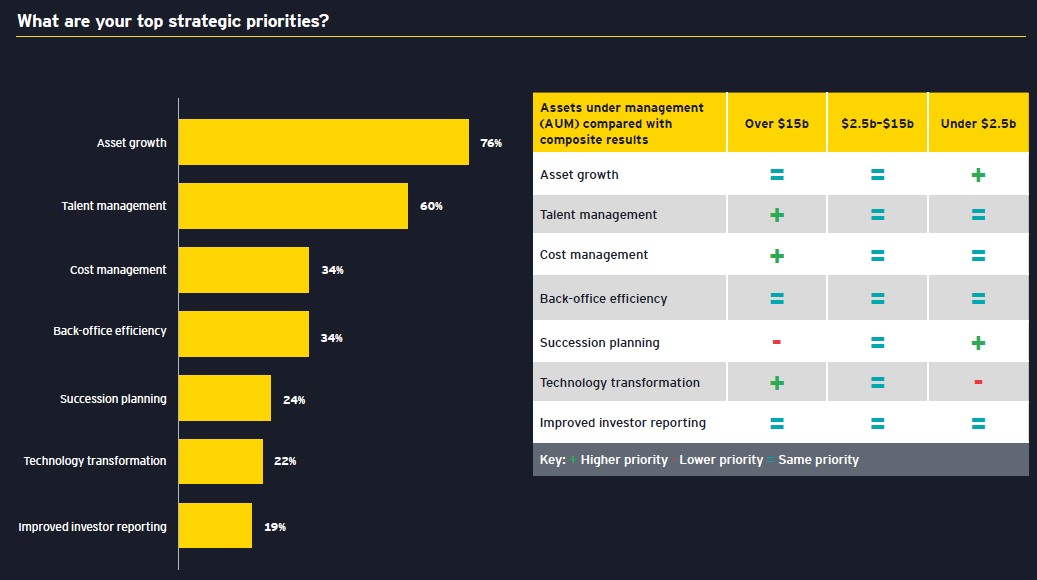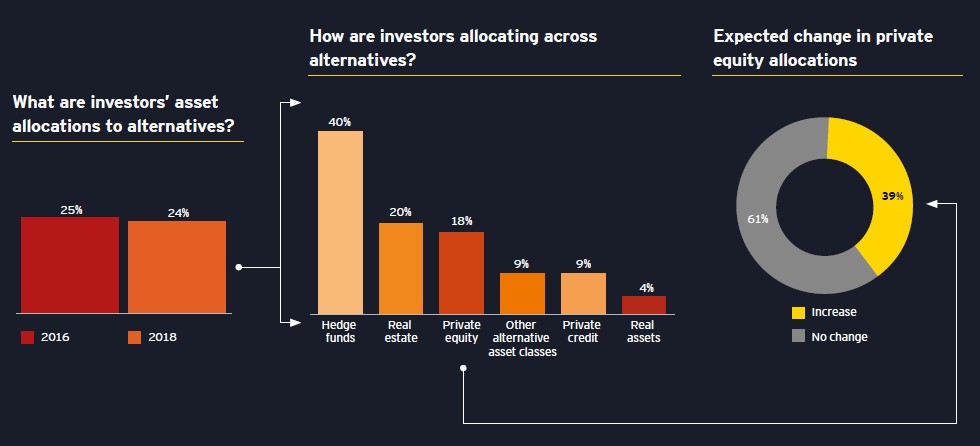EY released its 2019 Global Private Equity Survey. I think you’ll find key themes uncovered by the survey useful, especially on how PE firms plan to overcome margin erosion fueled by asset growth via talent, tech and outsourcing.
Q3 hedge fund letters, conference, scoops etc
Among the key findings:
- Diversity is a top priority: PE CFOs recognize the role diversity plays in fostering different perspectives. Therefore, 79 percent of CFOs report seek to improve gender diversity and 63 percent seek to increase cultural diversity.
- Uptick in tech: While the payoff has yet to be seen, PE CFOs acknowledge the long-term benefit. Over the past two years, 66 percent of private equity managers have made tech investments in the areas of fund accounting and 62 percent in investor relations. With that, 52 percent report to seek candidates with more data and analytics experience to strengthen their firm’s overall tech literacy.
- Outsourcing – a key advantage: The cost savings to be reaped by outsourcing outstrip prior hesitancies towards this practice. A majority of firms are already outsourcing some portion of their tax function (94%), compliance/regulatory reporting (71%) and fund accounting (55%).
How Do You See The Opportunity In Your Obstacles?
To reach operational excellence, private equity firms need the right insights to learn as they go – discovering new ways to overcome obstacles and seize opportunities.
2019 Global Private Equity Survey – Executive Summary
Private equity firms continued to pursue aggressive growth strategies in 2018, expanding portfolios through new offerings and bringing in more than $681 billion in new assets. Yet, even as the industry marked another year of unprecedented growth, many of the CFOs who participated in the sixth EY Global Private Equity Survey said they are still trying to overcome operational issues that impact margins and potentially impede their ability to compete for investment assets.
To be sure, private equity firms have made great strides in the years since we started this survey, building a solid foundation to support operational changes as they head into the digital age by deploying new technology solutions as well as other measures that may improve operational efficiency, such as relying on outsourced service providers for more routine functions. At the same time, many private equity CFOs recognize they still have a long way to go before they build a sophisticated IT infrastructure that rivals those maintained by long-standing mutual funds and hedge funds.
In many ways, as CFOs move their organizations down the road to operational efficiency, they are finding new challenges lurking around every bend. While these obstacles are hardly insurmountable, they often demand that CFOs make key decisions. For example, by customizing offerings to expand asset classes, CFOs may put firms in the position to raise additional funds. At the same time, these funds create greater complexity in terms of servicing, such as separate fee structures and reporting systems.
This is not entirely unexpected. Any organization that deploys new technology and business processes often encounters unforeseen complexities. Yet, private equity firms do not have the luxury to step back and reassess how to find a way forward. In fact, given the increasing pressure on margins, they will need to address this issue with some urgency. Nearly 40% of CFOs reported that margins have worsened over the past two years, while only 28% saw their margins improve in this period of asset growth.
Many private equity firms have begun to offer customized offerings for individual investors, such as separately managed accounts and funds of one. Firms are also looking to other asset classes, such as private debt, real assets and real estate. These asset classes have typically been offered by other types of asset managers, but now private equity managers are adding these offerings to their traditional fund offerings.
While most firms said they are moving rapidly to improve their operational infrastructure to address margin pressure, more than half, or 57%, said they were taking both a long, strategic approach while dealing with short-term issues as they arise. In some cases, this means they are also looking to deploy cutting-edge technology, taking the view that improving operations is not just a cost, but also an opportunity to adopt strategic, integrated digital IT systems that will help to accelerate growth and ultimately reduce the need to rely on increasing headcount as growth continues.
Like their counterparts in other industries, private equity CFOs face a rapidly changing and seemingly endless list of responsibilities. In recent years, these have expanded to include focus on preventing cyber attacks, managing talent and deploying new IT systems. Moreover, these tasks only add to their normal range of responsibilities, such as maintaining a well-run financial team and keeping an eye on margin erosion for the management company.
As in past years, this survey has focused on three key areas that represent the changing realm of responsibilities for private equity CFOs: technology, talent and outsourcing. We will touch on these briefly here before going into greater depth in the survey.
Technology
While private equity firms have deployed new IT systems over the past several years, many CFOs reported that they have yet to see the full payoff. This is simply due to the time lag between implementing new technology and realizing the full benefits. Many firms still need to make sure that they are entering clean data that will yield accurate reports.
Other firms still need to fully integrate systems among different functions. Of course, to get the most out of any new technology, firms also need to take steps to help people using the technology leverage its full capabilities. This is not an overnight process, and while firms are making progress, they still have a long way to go.
Given that many private equity firms are just emerging from the era of Excel spreadsheets, it’s not surprising that they have been slow to adopt next-generation technologies, such as robotics. Currently, only one-quarter of private equity managers plan to invest in robotics. Still, larger firms are more open to this option and have begun to develop use cases to determine how they would leverage robotics to manage portfolios and create efficiencies for routine operations.
Talent
Private equity CFOs play a pivotal role, often in the background, as the ones responsible for making sure their firms operate at a high state of efficiency and resiliency. Given the financial nature of the business, the CFOs are charged with driving technology transformation, overseeing talent development and deciding which business processes should be outsourced. In this role, they are also keenly aware of the need to elevate the talent within their organizations to remain competitive.
As margins come under increasing pressure, they face a distinct challenge, because they can’t simply hire more people to improve service delivery. Even more, private equity firms need to adjust their recruiting practices to attract a more diverse workforce, particularly people with IT backgrounds who are better equipped to leverage technology and interpret data. While smaller firms are confident they will have the right workforce in place three to five years from now, larger firms are less confident, because they are well aware they will need to hire people capable of exploiting the full capabilities of more sophisticated IT systems.
Outsourcing
In addition to in-house technology upgrades, outsourcing is another key way to alleviate margin pressures. While the mutual fund and hedge fund industries have long partnered with outsourcing providers, private equity firms have been slower to outsource. However, they are beginning to increase their spending with outsourcing providers, and we expect that to continue in the year ahead.
Outsourcing holds the potential to yield significant benefits for private equity firms. Outsourcing providers that have a robust technology platform and a proven infrastructure at their disposal to remove operational burdens would allow employees to focus on valueadded tasks by taking over the more routine and time-consuming activities currently being done in-house at higher costs.
The challenge ahead
As we’ve talked to CFOs over the course of conducting these surveys, it’s become increasingly clear they play a critical role as the architects of financial stability and the ultimate success of private equity and venture capital firms.
But they are also unsung heroes, working largely behind the scenes as they take on greatly expanded roles, guarding against margin erosion while also taking steps to help their organizations improve their cybersecurity, enhance talent management and deploy new IT systems.
Without their keen insights and active guidance and support, most private equity firms would be hard-pressed to compete for investment funds. They are ones who need to look ahead and see the obstacles on the road to operational efficiency and help firms continue moving forward down the path to success.
The growth agenda
Alternative investments continue to attract investors’ dollars. Investors who responded to our survey said that they had currently allocated approximately 24% of their assets to alternative investments. Private equity and private credit currently represent nearly 30% of investors’ alternatives portfolio. This allocation is expected to grow, as nearly 40% of investors indicated they plan to increase their exposure to private equity in the coming year. Based on current market conditions and the lack of significant returns in the public markets, private equity faces increased competition from other alternative investment participants, such as hedge funds. Many of these funds are looking to increase AUM through private investment vehicles or enhanced returns through private investments.
Of the 24% of investors’ investment allocation going to alternatives, traditional private equity makes up
nearly 20% of the typical investor’s alternatives portfolio, though many investors expect that to grow.
See the full article here by EY.com



